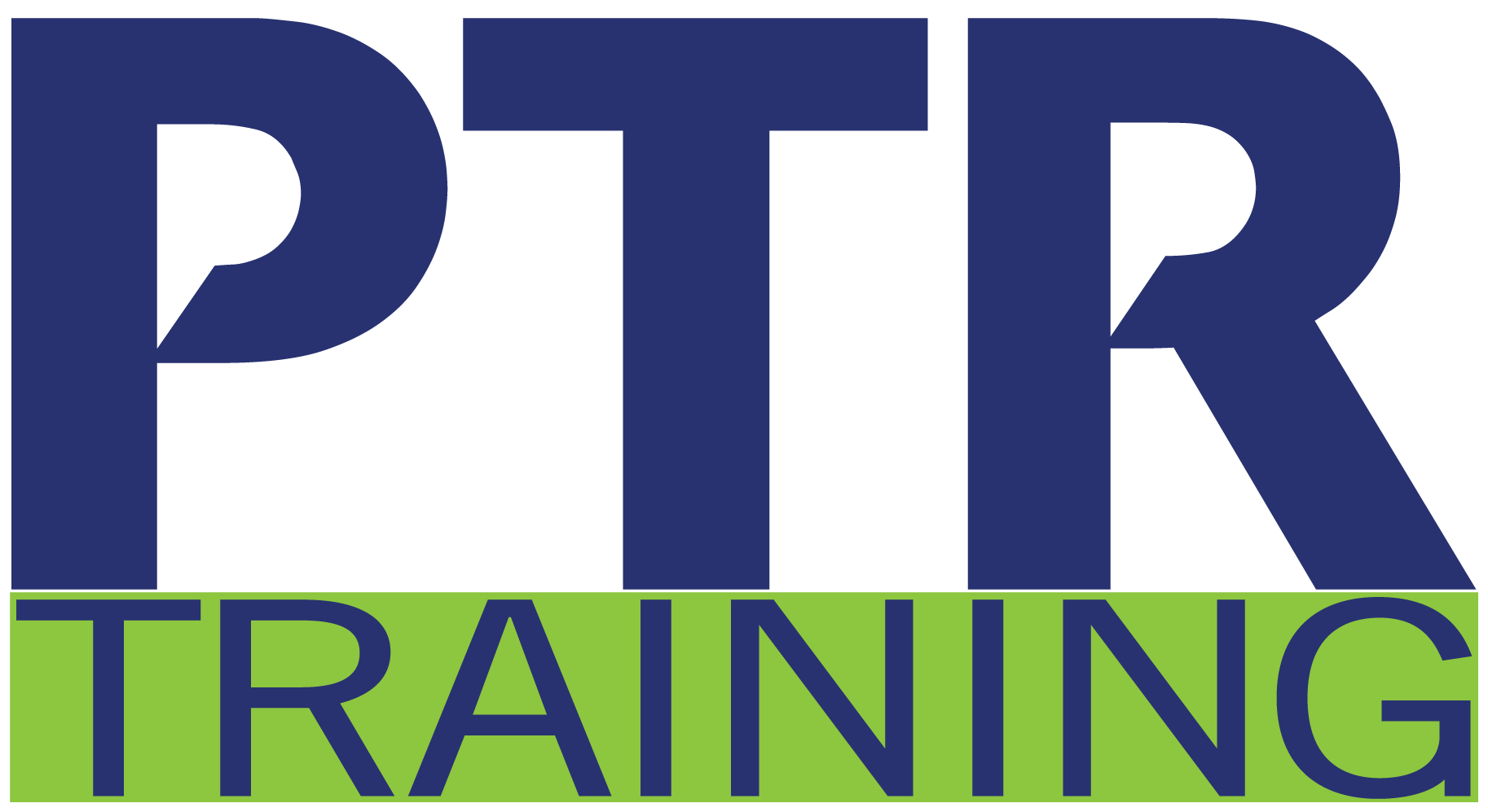
Landing a job often depends on your technical expertise, but thriving in that job depends on much more. Beyond degrees and certifications, employers look for people who can communicate well, adapt to change, and work effectively with others. These soft skills shape not just how you perform your role but also how you grow in your career.
Research by Harvard University, the Carnegie Foundation, and Stanford Research Center found that 85% of job success comes from having strong soft skills, while only 15% is attributed to technical knowledge. That means improving soft skills in the workplace is not just a nice-to-have—it’s a career necessity.
This blog will explore why soft skills matter, the most in-demand soft skills, and practical strategies on how to improve your soft skills in the workplace.
What Are Soft Skills?
Soft skills are the personal attributes, behaviors, and interpersonal abilities that shape how you work with others and approach challenges in the workplace. Unlike hard skills—which are technical and measurable, such as coding, accounting, or data analysis—soft skills are less tangible but equally important. They influence how you communicate, collaborate, solve problems, and adapt to change.
Think of soft skills as the bridge between your technical knowledge and your ability to apply it in real-world situations. For example, you might be excellent at data analysis (a hard skill), but without communication and storytelling (soft skills), you may struggle to present your findings in a way that influences decisions.
Soft skills are often transferable across jobs, industries, and even personal life, making them one of the most valuable assets for long-term career success.
Examples of Soft Skills
Soft skills cover a wide range of abilities that impact professional and personal growth. Some of the most important include:
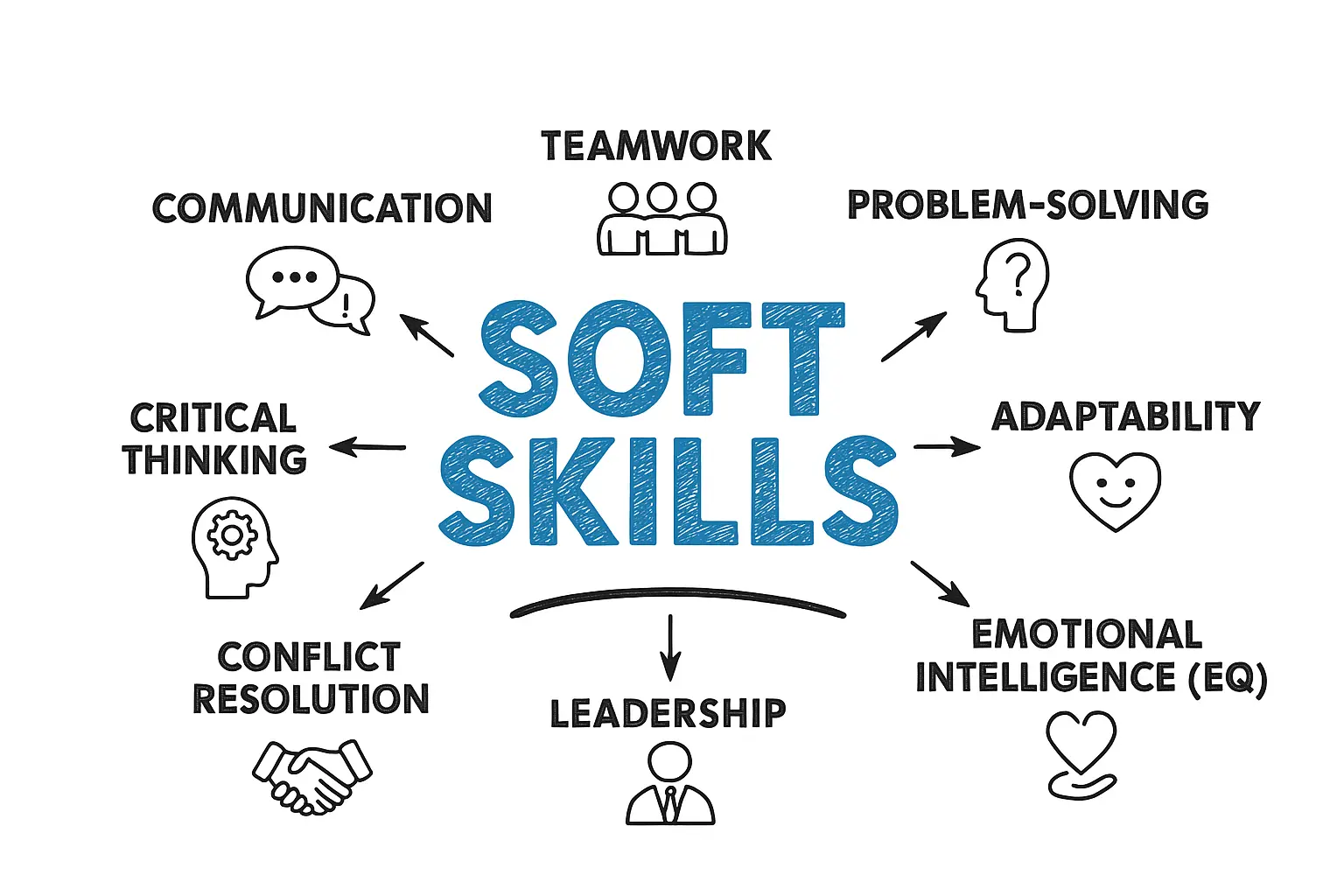
- Communication – Expressing ideas clearly, actively listening, and adjusting your style to fit the audience.
- Teamwork – Collaborating effectively, respecting diverse perspectives, and building trust among colleagues.
- Problem-Solving – Approaching challenges with creativity, resilience, and logical thinking.
- Adaptability – Adjusting quickly to new situations, technologies, or work environments.
- Time Management – Prioritizing tasks, meeting deadlines, and staying organized under pressure.
- Emotional Intelligence (EQ) – Recognizing and managing your own emotions while understanding and empathizing with others.
- Leadership – Inspiring and guiding individuals or teams, even without holding a formal managerial role.
- Conflict Resolution – Navigating disagreements calmly and finding constructive solutions.
- Critical Thinking – Analyzing information objectively and making sound decisions.
- Creativity – Generating fresh ideas, innovating, and thinking outside the box.
These examples show why soft skills are sometimes called “power skills.” They don’t just complement hard skills—they amplify them, allowing you to maximize your impact in the workplace.
Why Soft Skills Matter More Than Ever
Soft skills, also known as “people skills” or “human capabilities,” include communication, teamwork, problem-solving, emotional intelligence, adaptability, and leadership. They are the foundation of how you interact, collaborate, and influence others.
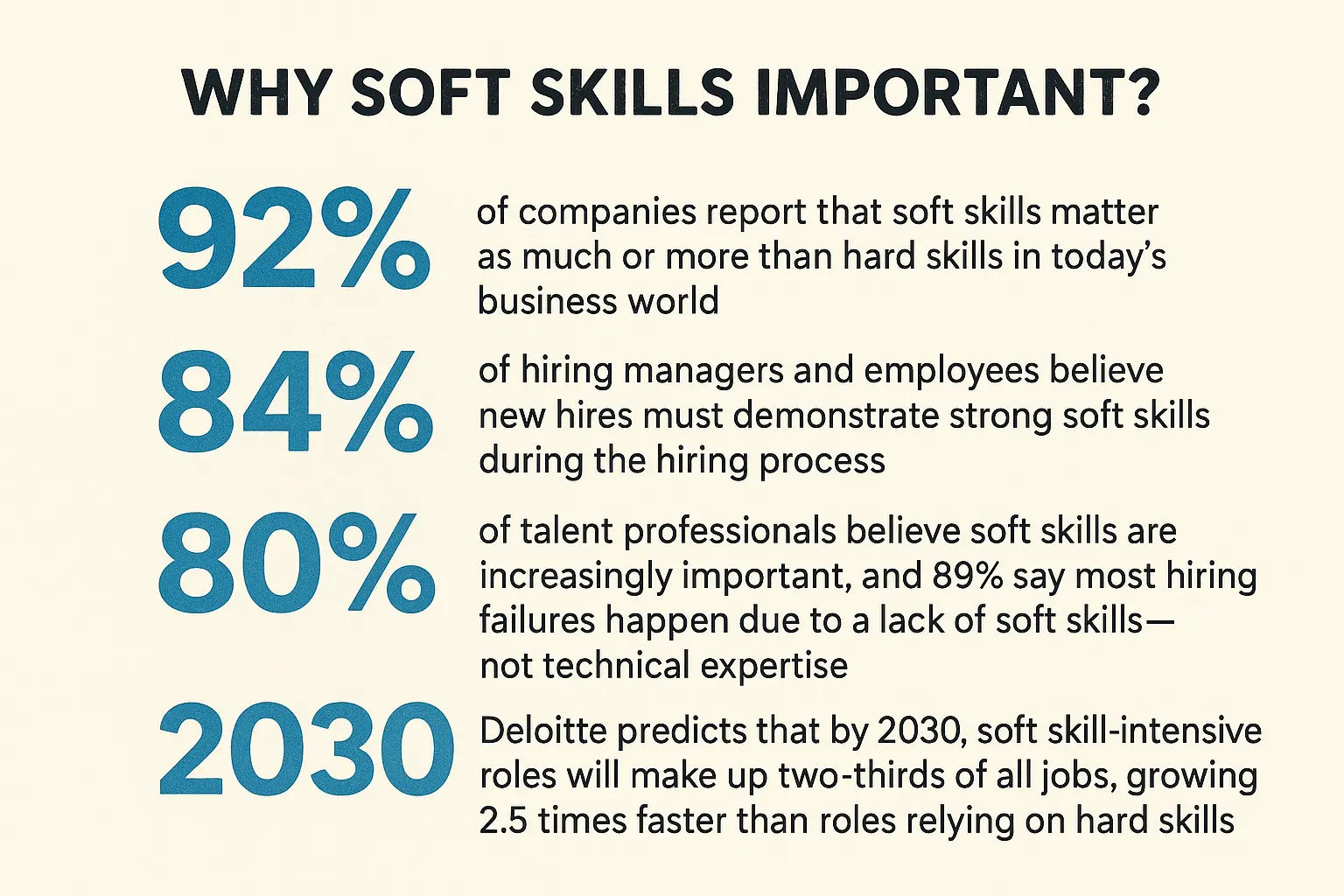
Recent statistics prove just how critical they are:
- 92% of companies report that soft skills matter as much or more than hard skills in today’s business world (Deloitte Insights).
- 84% of hiring managers and employees believe new hires must demonstrate strong soft skills during the hiring process. In larger organizations (500+ employees), this number jumps to 90%.
- According to LinkedIn’s Global Talent Trends Report, 80% of talent professionals believe soft skills are increasingly important, and 89% say most hiring failures happen due to a lack of soft skills—not technical expertise.
- Deloitte predicts that by 2030, soft skill–intensive roles will make up two-thirds of all jobs, growing 2.5 times faster than roles relying on hard skills.
In short, technical expertise may land you a job, but soft skills are what will sustain and accelerate your career growth.
The Most Valuable Soft Skills in the Workplace
Before diving into how to improve soft skills in the workplace, let’s first identify which ones employers value most.
According to recent studies, the top three soft skills are:
- Communication (25%) – the ability to express ideas clearly and listen actively.
- Problem-Solving (21%) – approaching challenges with creativity and resilience.
- Time Management (19%) – balancing tasks and priorities efficiently.
Other high-demand soft skills include teamwork, adaptability, leadership, and emotional intelligence—all of which influence how effectively you navigate complex, fast-changing work environments.
How to Improve Soft Skills in the Workplace
Now let’s get practical. Developing soft skills isn’t about memorizing rules—it’s about practicing intentional behaviors that strengthen the way you interact and contribute at work. Here are 10 proven strategies:
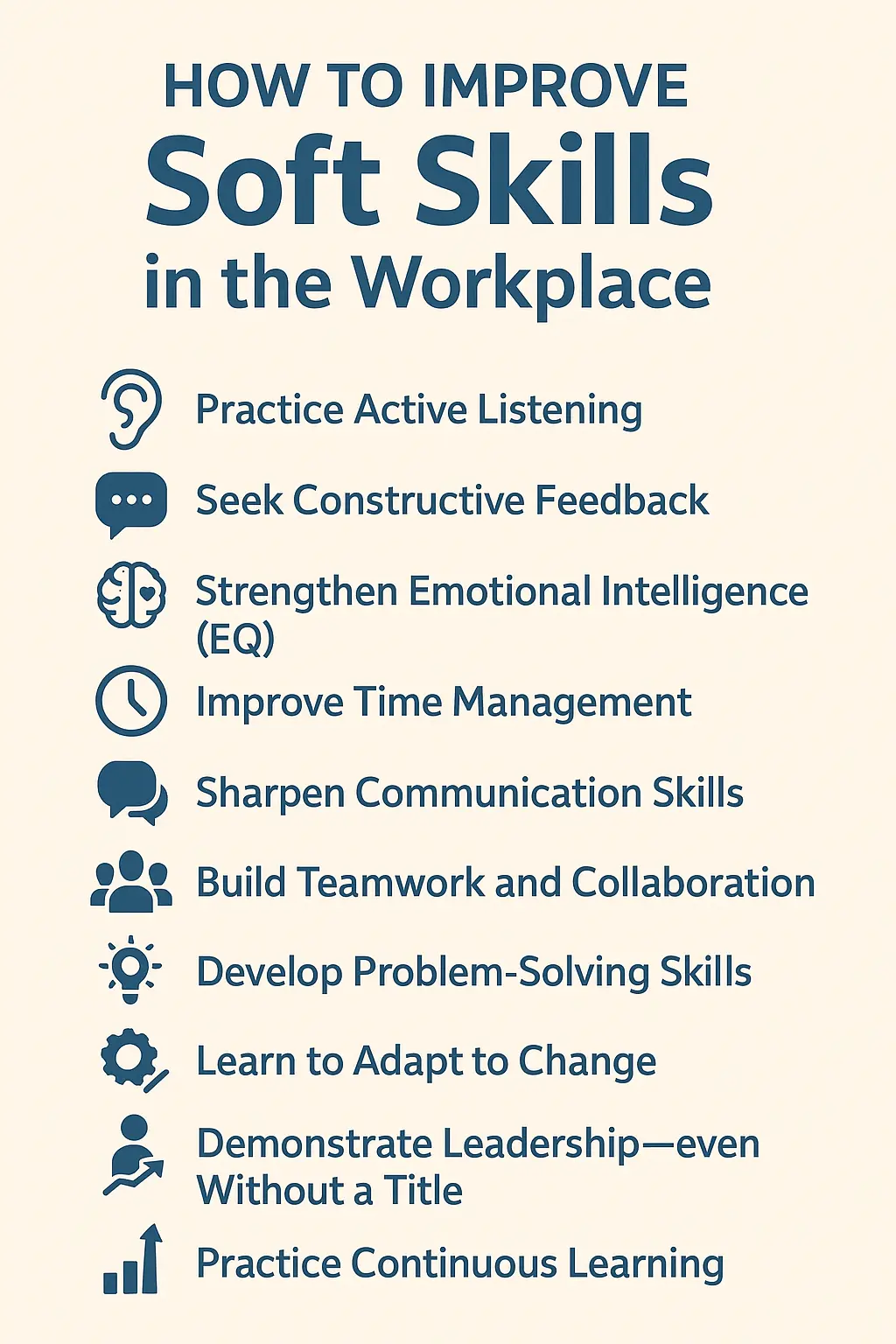
1. Practice Active Listening
Strong communication begins with active listening. Pay close attention not just to words but also to tone, pace, and body language. Show that you value others’ input by reflecting back what you’ve heard and asking clarifying questions. This simple practice builds trust, prevents misunderstandings, and strengthens workplace relationships.
2. Seek Constructive Feedback
Growth comes from feedback. Ask colleagues, managers, or mentors to share honest insights about your communication, collaboration, or leadership style. Instead of being defensive, view feedback as a valuable learning tool. By accepting input with an open mind, you’ll identify blind spots, make meaningful improvements, and build credibility with your team.
3. Strengthen Emotional Intelligence (EQ)
Emotional intelligence is a game-changer for leaders and employees alike. Studies show that 90% of top performers have high EQ. Work on recognizing your emotions, managing stress, and practicing empathy. By better understanding yourself and others, you’ll build stronger connections, handle conflicts effectively, and become more approachable and trusted in the workplace.
4. Improve Time Management
Managing time effectively improves both productivity and work-life balance. Use calendars, reminders, or techniques taught in Project Management Courses to stay on track. Apply the 80/20 rule: focus on the 20% of tasks that deliver 80% of results. Prioritizing high-value activities helps you achieve goals faster, avoid unnecessary stress, and prevent burnout.
5. Sharpen Communication Skills
Clear communication is at the core of workplace success. Whether you’re writing an email, pitching ideas, or leading meetings, focus on being clear, concise, and audience-focused. Avoid jargon, tailor your tone to the situation, and aim for clarity over complexity. Great communicators inspire trust and ensure their ideas are heard.
Explore: Communication Training Courses
6. Build Teamwork and Collaboration
No workplace success happens alone. Strengthen teamwork by collaborating across departments, encouraging diverse input, and valuing different perspectives. When conflicts arise, approach them respectfully and work toward solutions. Collaboration creates stronger relationships, fosters innovation, and helps teams achieve more together than they could individually. Strong teams always drive organizational success.
7. Develop Problem-Solving Skills
Problem-solving is one of the most in-demand soft skills today. Instead of panicking when challenges arise, reframe them as opportunities for growth. Break down complex issues into manageable steps, brainstorm possible solutions, and involve others for fresh perspectives. This proactive mindset helps you tackle obstacles confidently and strengthens your professional reputation.
8. Learn to Adapt to Change
Change is constant in today’s workplace, from hybrid work models to AI and digital transformation. Adaptability means staying flexible, learning new skills quickly, and embracing change instead of resisting it. Being open to different workflows, tools, and leadership styles demonstrates resilience and makes you a valuable asset in evolving environments.
9. Demonstrate Leadership—even Without a Title
Leadership isn’t limited to those in management roles. Show leadership by taking initiative, practicing accountable leadership, and inspiring others through action. Volunteer for challenging projects, mentor junior colleagues, and look for opportunities to contribute beyond your role. Demonstrating leadership qualities early builds trust, positions you for growth, and strengthens your professional brand.
10. Practice Continuous Learning
Enroll in workshops, online courses, or training programs that focus on soft skills. Research shows that leading organizations worldwide increasingly prioritize soft-skill development because it directly impacts collaboration, employee engagement, and long-term success. By continuously upgrading your abilities, you not only stay relevant in today’s fast-changing workplace but also position yourself as a valuable, adaptable professional.
The Gender Perspective on Soft Skills
Interestingly, surveys reveal some gender-based insights into soft skill value:
- 80% of women agreed that soft skills are crucial in the workplace.
- 90% of men also reported valuing soft skills highly.
Top reasons why soft skills are considered important include:
- They make or break hiring decisions (22%).
- They are essential for career development (18%).
- They differentiate otherwise similar candidates (17%).
These statistics highlight that regardless of gender, improving soft skills in the workplace is seen as a cornerstone for career advancement.
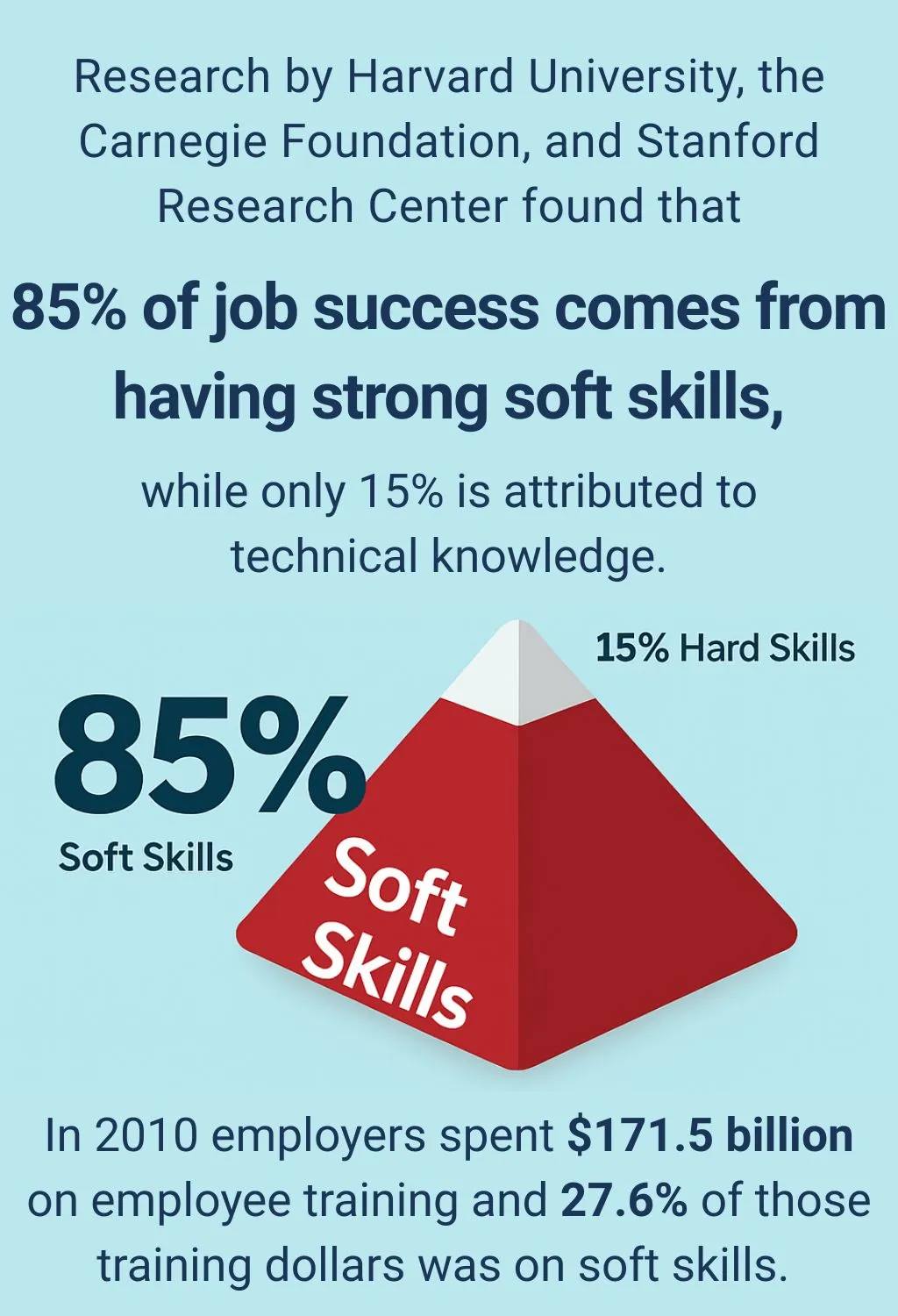
Why Employers Prioritize Soft Skills Over Hard Skills
From an employer’s point of view, technical skills are only the starting line. Hard skills ensure that an employee can perform the role, but soft skills determine how well they thrive, adapt, and contribute to the company’s long-term success.
Managers consistently report that technical knowledge can be taught through training, but qualities like adaptability, empathy, or leadership are far more difficult to instill. This is why soft skills often become the deciding factor in promotions, leadership opportunities, and high-stakes projects.
Employers prioritize soft skills because they directly impact business outcomes:
- Collaboration and teamwork lead to smoother workflows and innovation.
- Strong communication reduces costly errors and boosts client relationships.
- Problem-solving and adaptability keep organizations agile in fast-changing markets.
- Emotional intelligence improves employee engagement and lowers turnover.
In short, while hard skills prove you’re qualified, soft skills prove you’re ready to grow, lead, and add lasting value to the organization.
Final Thoughts
If you’re wondering how to improve your soft skills in the workplace, start small but be consistent. Commit to active listening in meetings, reflect on feedback instead of avoiding it, and practice empathy in daily conversations. Over time, these small steps add up to meaningful growth.
Start with just one soft skill—maybe listening more closely in meetings or organizing your tasks better—and focus on practicing it. Small, consistent changes can make a big difference over time. And if you’re ready to grow even further, explore professional development training courses that can help you strengthen these skills in a real-world setting.
FAQs
1. What are soft skills and why are they important in the workplace?
Soft skills are personal attributes like communication, teamwork, adaptability, and problem-solving. They’re important because 85% of job success comes from strong soft skills, while only 15% comes from technical skills.
2. How can I improve my soft skills at work?
You can improve soft skills by practicing active listening, seeking feedback, developing emotional intelligence, managing time effectively, and collaborating with others.
3. Which soft skills are most valued by employers?
Communication, problem-solving, teamwork, adaptability, time management, and leadership are among the most in-demand soft skills today.
4. How can companies help employees improve soft skills?
Companies can invest in training, workshops, mentoring programs, and continuous learning opportunities to build soft skills across teams.
5. Are soft skills more important than hard skills?
Both are essential, but research shows employers prioritize soft skills because they’re harder to teach and have a direct impact on teamwork, productivity, and leadership.
